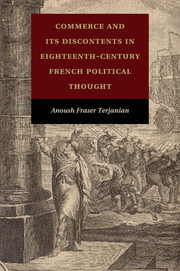
- Cited by 8
-
Cited byCrossref Citations
This Book has been cited by the following publications. This list is generated based on data provided by Crossref.
Weststeijn, Arthur 2014. The Legacy of Dutch Brazil. p. 187.
2015. Free Trade and its Enemies in France, 1814–1851. p. 1.
Earley, Benjamin 2016. Commerce, militarism and luxury: eighteenth-century French depictions of the Athenian Empire. Classical Receptions Journal, Vol. 8, Issue. 1, p. 11.
Trivellato, Francesca 2016. Between Usury and the “Spirit of Commerce”. French Historical Studies, Vol. 39, Issue. 4, p. 645.
Livesey, James 2019. An Alternative Genealogy for Global Capitalism: The Rhine Becomes an Inland Sea, 1792–1815. Critical Historical Studies, Vol. 6, Issue. 2, p. 223.
Viejo Yharrassarry, Julián 2021. El caso Climent. ¿Ilustración católica o catolicismo ilustrado?. Hispania, Vol. 81, Issue. 269, p. 651.
Prevignano, Emma 2022. A Passport for the Metre The Diplomatic Recognition of the Metric System in a Changing International Order (1785–1799). Centaurus, Vol. 64, Issue. 4, p. 889.
Freer, Alexander 2024. Notes Toward a History of Gentleness. The Wordsworth Circle, Vol. 55, Issue. 2, p. 180.
- Publisher:
- Cambridge University Press
- Online publication date:
- November 2012
- Print publication year:
- 2012
- Online ISBN:
- 9781139047517


